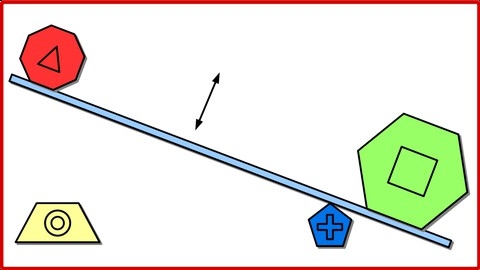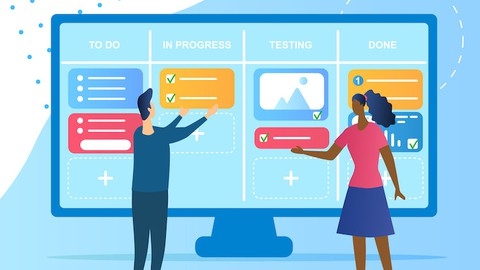Agile Crash Course: Agile Project Management; Agile Delivery
The course starts by introducing you to the Agile methodology and its core concepts.
You’ll learn the definition of Agile, how it differs from traditional methodologies, and its 12 guiding principles.
The first chapter also covers a brief history of Agile and how it can be applied across various industries.
As you progress through The Middle section, you’ll dive deeper into the key Agile concepts like user stories, story points, backlogs, sprints, velocity, and more.
The course explains the roles within an Agile team, such as the Scrum Master, Product Owner, and Delivery Team.
You’ll also learn about essential Agile tools like burndown charts, Kanban boards, and sticky notes.
One of the highlights is the Agile Smart Pack, which provides free templates, examples, guides, and cheat sheets to help you implement Agile effectively.
The course demystifies Agile rituals like sprint planning, daily stand-ups, reviews, and retrospectives, while also addressing common myths surrounding Agile.
Real-world examples are a significant part of the course.
You’ll see an Agile Kanban board in action, both for IT and non-IT projects.
The syllabus includes a quick tour of Jira, a popular Agile tool from Atlassian, and even covers using ChatGPT for Agile project management.
Towards the end, you’ll learn how to get started with Agile, including the “Sprint Zero” planning phase.
The course also covers Agile job opportunities and salaries, as well as a case study on breaking down complex projects into manageable tasks using Agile.
The course wraps up with a recap, an easy final exam, and bonus lectures addressing frequently asked questions and providing additional resources.
The Project Management Course: Beginner to PROject Manager
The course starts by introducing you to projects and project management concepts.
You’ll learn what a project is, why companies execute them, and the role of a project manager.
It touches on the skills and knowledge required, along with some history and terminology.
In the initiation phase, you’ll dive into defining project goals, creating a business case, understanding scope and feasibility studies, and conducting risk assessments.
You’ll also learn how to put together a project charter.
The planning phase is extensive and covers several crucial areas.
You’ll learn why planning is so critical, how to estimate timelines while accounting for biases, identifying dependencies and the critical path, using Gantt charts, and building project schedules.
It also covers budgeting, procurement, resource planning, quality requirements, managing expectations and assumptions, risk logs, and the change process.
During the execution phase, the focus shifts to running meetings, maintaining a project diary, managing tasks and the team.
The monitoring and control section teaches you how to track schedules, budgets, quality, risks, and change proposals.
The course dedicates a segment to issue management during execution, including status reporting.
It also guides you through properly closing out a project.
Additionally, you’ll get hands-on training with Microsoft Excel for project management tasks like tracking, logs, schedules, Gantt charts, and budgeting.
There’s also an introduction to Agile methodologies like Scrum, comparing them to traditional Waterfall approaches.
Beginning Project Management: Project Management Level One
The course starts by laying the groundwork, explaining what a project is and the roles and responsibilities of a project manager.
You’ll learn about the five key process groups that make up the project management life cycle: initiating, planning, executing, monitoring/controlling, and closing.
In the initiation phase, you’ll understand how to create a project charter that authorizes the project and assigns the project manager.
You’ll also learn to identify and document stakeholder needs.
The planning section is extensive, covering how to define the project management plan, scope statement, schedule, cost estimates, quality planning, and risk management approaches.
Proper planning is crucial for project success.
Execution focuses on actually doing the work - managing the team, hosting effective meetings, communicating status updates, and keeping stakeholders engaged.
You can’t just plan, you have to take action.
Monitoring and controlling runs alongside execution.
You’ll learn techniques for controlling project work, managing the team, overseeing communications, and maintaining stakeholder involvement as the project progresses.
Finally, the closing phase walks through wrapping up a project phase or the entire project, including obtaining customer acceptance and transitioning the deliverables.
You’ll gain a clear understanding of how to initiate, plan, execute, monitor, and close out projects successfully.
Project Management Fundamentals
You’ll kick things off with an introduction that lays the groundwork for the 12-step process you’ll follow throughout the course.
Once you grasp the big picture, you’ll dive into defining your project - a crucial first step that sets the stage for everything else.
From there, it’s all about breaking down your project into manageable tasks using a Work Breakdown Structure.
This hands-on approach with post-it notes and arrows will help you visualize the flow and dependencies between tasks.
Estimating task durations can be tricky, but the course has you covered with practical tips on how to approach this challenge.
You’ll learn about the critical path - the sequence of tasks that can’t be delayed without impacting the entire project timeline.
To ensure your project stays on track, you’ll explore techniques like adding a safety margin and conducting regular progress checks using a Gantt chart.
This visual representation will become your best friend for monitoring tasks, resources, costs, and that all-important critical path.
Risk analysis is another key component, helping you identify potential roadblocks and plan accordingly.
And when the inevitable hiccups occur, you’ll know how to adjust your plan and keep things moving forward.
Throughout the course, you’ll gain hands-on experience with tools like Excel for creating Gantt charts, budgeting, and resource planning.
And let’s not forget the “Now Line” - a simple yet powerful concept for tracking your progress in real-time.
By the end, you’ll have a solid grasp of the entire project management lifecycle, from initial planning to post-project reviews.
And who knows, you might even develop a love for Gantt charts along the way!
Azure DevOps Boards for Project Managers/Analyst/Developers
You’ll start by learning how to create teams and epics within Azure DevOps (formerly known as VSTS or TFS).
From there, you’ll dive into breaking down those epics into features, product backlogs, and tasks - the building blocks of any project.
But it doesn’t stop at just creating work items.
The course teaches you how to leverage powerful features like task boards to visualize and manage your workflow.
You’ll also learn to create queries, charts, and customized dashboards to gain insights into your project’s progress.
Capacity planning is crucial for effective resource allocation.
This course guides you through integrating Azure DevOps with Excel and setting up notifications to stay on top of your team’s workload.
Plus, you’ll master the art of updating multiple work items simultaneously, saving you valuable time.
Customization is key in any project management tool.
You’ll learn how to create custom processes and work item types like “Tickets” to fit your unique needs.
And if you ever need a refresher, handy PDF notes are provided for quick reference.
The course culminates with a final assessment to test your knowledge of Azure DevOps and agile concepts.
Upon completion, you’ll receive a sneak peek into the “IT Business Analyst and Managers Technical Awareness” course, expanding your skillset even further.
Project Management Essentials
You’ll start by getting an overview of what project management is all about - its fundamentals, who can use it, and how to apply it even to small projects.
The course covers the overall process framework and introduces you to the critical “triple constraint” concept that lies at the heart of project management.
The course then dives into the five stages of the project management life cycle.
In the Initiation stage, you’ll learn the importance of clearly documenting the project objective as the very first step.
This includes defining the scope, assumptions, constraints, and proposed solution.
Next is the Planning stage, which is arguably the most crucial phase.
You’ll learn how to create a detailed plan by breaking down the work into deliverables (Work Breakdown Structure), mapping dependencies (Precedence Diagram), creating schedules (Gantt charts), estimating costs, and managing risks.
By the end, you’ll have a comprehensive project plan ready.
The Execution stage covers best practices for building an effective and diverse project team.
Then comes Monitoring & Control, where you’ll learn techniques to manage scope, schedule, cost, and risks through processes like change control boards and monthly status reviews.
Finally, the Closing stage guides you on wrapping up the project, creating the final report, and following up on recommendations.
Throughout the course, you’ll find exercises to apply the concepts to your own project, really driving home the learnings.
The practice test at the end helps reinforce the key takeaways.
Deeply Practical Project Management (16 PDUs)
The syllabus covers the entire project life cycle, from initiation to closing, ensuring you gain a thorough understanding of the project management process.
The course begins with an overview of project management fundamentals, including the PMI framework, the triple constraint, and the key drivers of project success.
You’ll learn about the critical role of the project manager and the essential skills required, such as communication, team formation, and leadership.
In the initiation phase, you’ll dive into developing a solid project foundation by defining the objective, scope, business case, and project charter.
The course emphasizes the importance of stakeholder analysis and management, ensuring you can effectively engage and manage project stakeholders.
The planning phase is extensive, covering requirements gathering, solution definition, work breakdown structure (WBS), precedence diagramming, estimating techniques (including PERT and Delphi), scheduling (Gantt charts and critical path analysis), resource planning, cost estimation, procurement planning, and risk management.
You’ll learn how to create a comprehensive project plan that balances scope, schedule, and budget.
During the execution phase, the course focuses on building and managing the project team, effective communication modes, problem identification using tools like the Ishikawa (fishbone) diagram, and iterative design and user reviews to ensure the project delivers what the customer needs.
The monitoring and control phase covers essential topics such as the weekly and monthly project status meetings, scope change management, schedule and cost control, risk management, earned value management (EVM) for accurate projections, quality management through peer and user reviews, and problem resolution techniques.
Finally, the closing phase guides you through procurement closure, scope verification (including scenario-based verification), lessons learned documentation, team transition, project celebration, and the final report.
Throughout the course, you’ll have opportunities to practice your skills by working on exercises and baselining your project documentation, such as the WBS, precedence diagram, risk register, and project plan.
The syllabus includes quizzes to reinforce your learning and downloadable resources like templates, examples, and summary checklists.
PMP Certification Exam Prep 35 PDU Project Management Course
The course provides comprehensive coverage of all the knowledge areas and processes involved in project management to prepare you for the PMP certification exam.
It starts with an introduction to fundamental project management concepts like what a project is, its life cycle, process groups, and knowledge areas.
The course then dives deep into each of the 10 knowledge areas - Integration, Scope, Schedule, Cost, Quality, Resource, Communications, Risk, Procurement, and Stakeholder Management.
For each area, it methodically explains the processes, inputs, tools/techniques, and outputs involved.
The course uses practical examples, sample questions, and assignments to reinforce the concepts.
Some key strengths of the course:
- Extensive coverage of Earned Value Management (EVM) concepts like CV, SV, CPI, SPI with detailed examples and practice questions.
This is crucial for the exam.
-
Dedicated sections on important tools like the Work Breakdown Structure (WBS), Network Diagrams, Control Charts, and Risk Analysis techniques.
-
Focus on key formulas, calculations, and interpretation for Schedule, Cost, and Risk Management areas.
-
Detailed overview of procurement concepts like contract types, source selection, and handling changes/claims.
-
Comprehensive lessons on team management, conflict resolution, motivation theories, and leadership styles.
-
Separate modules covering the latest Agile/Hybrid project management methodologies and principles.
The course also covers peripheral topics like communication management, stakeholder analysis, governance, compliance, and organizational change - all relevant for the PMP exam.
The review sessions at the end provide a concise recap.
Agile PM 201 - Understanding Agile at a Deeper Level
The syllabus covers a wide range of topics, starting with an introduction to Agile fundamentals.
You’ll learn about the history of Agile, the Agile Manifesto values and principles, and gain a solid understanding of the Scrum methodology, including its roles, practices, and values.
This foundation will help you grasp the core concepts of Agile project management.
But the course goes beyond the basics.
It delves into the differences between Agile and traditional plan-driven methodologies, exploring concepts like empirical versus defined process models, the management of uncertainty, and the shift from the Iron Triangle to the Agile Triangle, which emphasizes customer value.
You’ll also gain insights into systems thinking and complex adaptive systems, which are essential for understanding the “big picture” of Agile.
The course explores the roots of Agile, including Total Quality Management (TQM) principles from W. Edwards Deming and the influence of lean manufacturing.
Managing flow in Agile projects is another key area covered, with lectures on Kanban, cumulative flow diagrams, and the theory of constraints.
The syllabus also includes sections on lean software development, value stream analysis, and advanced Agile/Scrum principles from Ken Rubin’s book “Essential Scrum.”
To reinforce your learning, the course includes quizzes and an example of a real-world Scrum project.
Additionally, you’ll get an overview of other Agile methodologies like Extreme Programming (XP) and Dynamic Systems Development Method (DSDM).
Agile Project Management in 30 Minutes
The course starts with an introduction to agile project management, explaining what it is and how it differs from traditional approaches.
You’ll learn about the key elements of agile, such as planning, delivering, and learning through continuous improvement.
The course even includes a technique tip on using Kanban boards for better visualization and workflow management.
One of the highlights is the exercise on mastering the 15-minute standup meeting, a crucial agile practice for daily team sync-ups.
You’ll also get to assess if agile is the right fit for your projects and when it may not be the best approach.
Throughout the course, you’ll have access to a participant resource guide to reinforce the concepts.
The exercises and progress checks will help you apply what you’ve learned and gauge your understanding.
While the course is called “Agile Project Management in 30 Minutes”, don’t let the short duration fool you.
It covers a lot of ground, from presenting the agile idea to your team to identifying additional resources for further learning.
If you’re looking for a quick yet comprehensive overview of agile project management, this course could be a great option.










